For those with rooftop solar installations, there’s potential to generate surplus energy. While your utility could compensate you for this surplus via net metering, you also have the option to store this energy in a battery for subsequent use. When you possess a battery charged with pristine electricity, it empowers you to sidestep peak fee periods, diminish your dependence on your utility, harness solar power after sundown, and ensure power availability during outages. Pairing solar with adequate storage could pave the way for a feasible off-grid existence.
We examined over twelve batteries, and these are our selections for the cream of the crop. It’s noteworthy that the batteries spotlighted here weren’t chosen post hands-on experiments. Given the intrinsic bulkiness of solar batteries and their integration into domestic energy infrastructures, physical testing poses challenges. Rather, our assessment hinged on manufacturers’ product specifications, accessible online data from manufacturers, and our meticulously designed research strategy.
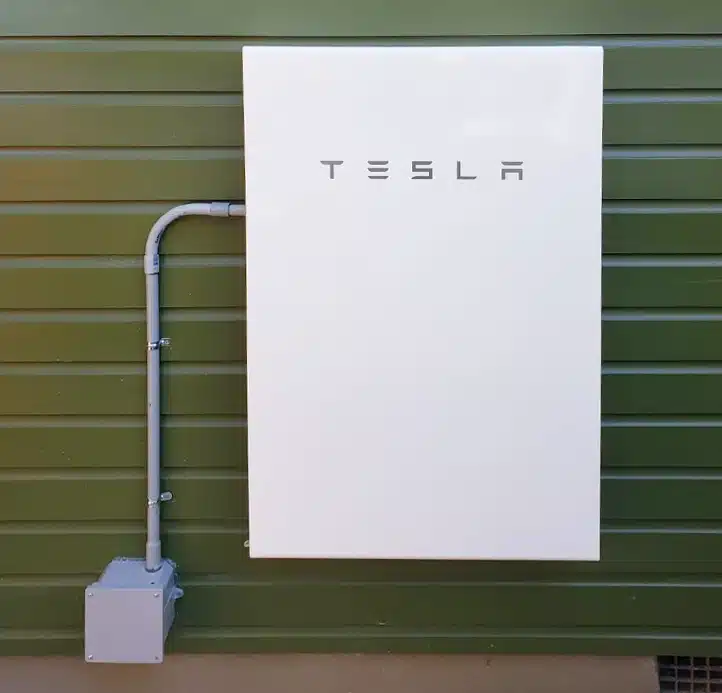
Top Choice
The Tesla Powerwall is notably average for household batteries, which can be a strength. Its infinite cycle warranty is certainly impressive. However, its shortcomings lie in its lack of modularity, customer support, and its single size offering. Want more capacity? You’d need to purchase an additional 13.5kWh unit. To lear more read our Tesla battery review.
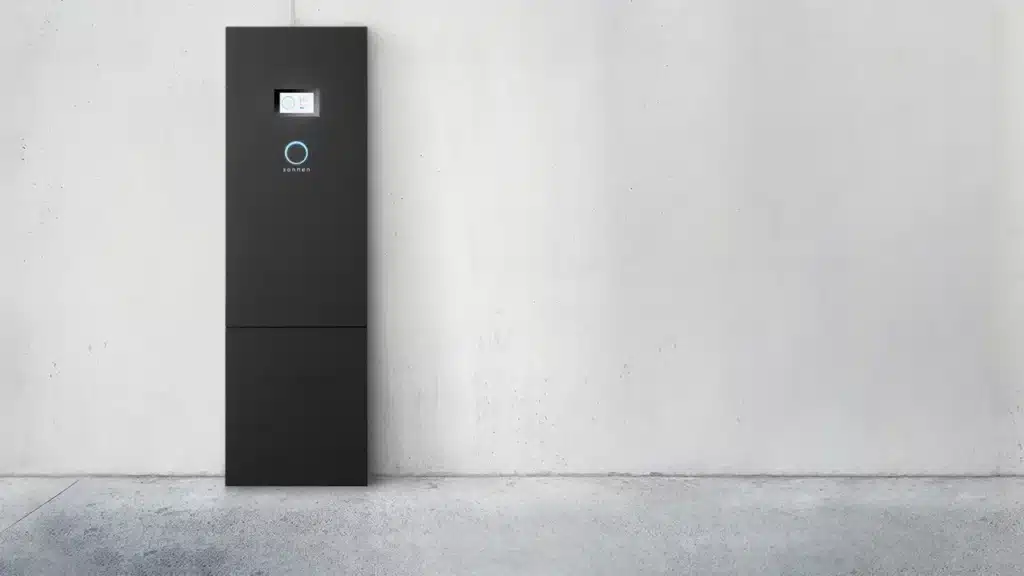
Best for Virtual Power Plants (VPPs)
With Sonnen EcoLinx, you not only get backup power but also a connection to a virtual power plant network, resulting in reduced electric costs and potential extra earnings. Its modularity and warranty are top-notch. On the downside, it’s pricey and less efficient.
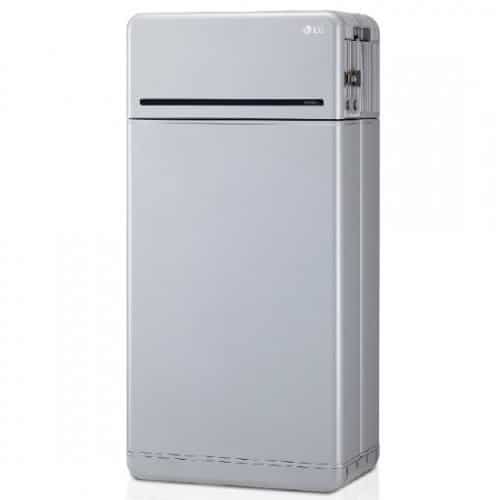
Top Value Option
Offering commendable performance specs for its price, the LGES 16H Prime is an attractive option for those seeking more capacity on a budget. No need for solar panels to operate it. However, it doesn’t boast many features beyond its size. Its warranty is standard, and adding capacity can be cumbersome and costly.
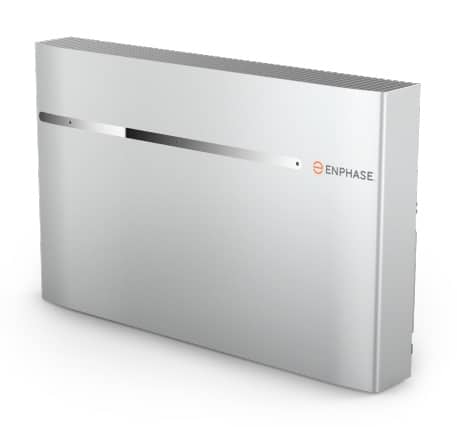
Budget Friendly
For those on a budget, Enphase batteries are a favorite. However, opting for this means trading power and efficiency (in AC-coupled setups) for cost.
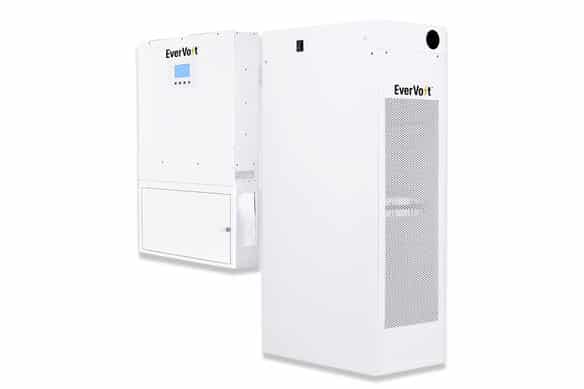
Flexibility
The Panasonic Evervolt Home Battery presents users with a modular design without compromising power. This battery is available in capacities of 9, 13.5, and 18kWh, with the flexibility to extend by 4.5kWh segments. A notable feature is its robust 12-year warranty, complemented by a steady continuous power delivery (7.6kW). However, its AC round-trip efficiency and depth of discharge do not quite meet our expectations.
Solar batteries are designed to retain the surplus electricity that your solar panels produce. When you equip your system with a solar battery, the extra electricity generated by your panels is stored rather than being lost. This stored energy is handy during times when solar panels aren’t producing electricity efficiently, like during the night or on overcast days.
With solar batteries, you’re equipped with power even during blackouts. With an optimal battery arrangement, it’s even feasible to disconnect from the grid entirely. Being off-grid translates to complete energy autonomy, letting you say goodbye to electricity bills. But if you prefer, you can still combine a solar battery with a grid-connected solar system. A hybrid system – connecting a solar battery to an on-grid solar setup – allows you to tap into your stored solar-generated electricity, potentially reducing your electricity bills.
Weighing the pros and cons of solar batteries:
Solar batteries, much like solar panels, have their benefits and drawbacks. On the upside, a solar battery can diminish your electricity expenses, shield you during power interruptions, and reduce your dependency on the electricity grid. On the downside, they come with a hefty price tag, often rivaling the cost of the solar panels themselves.
Your solar setup’s size will dictate the number of batteries you’ll require. If an off-grid life appeals to you, anticipate a heftier investment in solar storage.
Benefits:
Ensures power availability during blackouts.
Minimizes reliance on the electrical grid.
Offers protection against rising electricity prices.
Simplifies energy tracking.
Drawbacks:
Solar batteries can be quite pricey.
There’s a possibility you’ll require several batteries.
Maintenance isn’t free.
Picking a solar battery is not solely about its price tag. It’s essential to find one that aligns with your home’s energy consumption and can provide the required power, especially if you have large electrical devices like HVAC systems, fridges, or even EVs.
When weighing your options, factor in battery modularity (the flexibility to increase capacity if needed) and compatibility with your solar panels. Given the substantial investment, also compare battery warranties. Generally, solar batteries last between five and 15 years, with most companies offering a 10-year warranty.
It’s crucial not to rush this decision. Examine the variety of options and seek quotations from diverse installers to pinpoint the ideal battery tailored to your home’s energy demands.
The differentiation between AC and DC coupling lies in how electricity travels from your solar panels to your battery. Direct Current (DC) involves electricity flowing in one direction, whereas Alternating Current (AC) means the current periodically reverses direction.
For AC-coupled systems, the stored electricity must be converted (inverted) several times before your home can use it. Here, DC electricity from panels goes to an inverter which converts it to AC, and this is then converted back to DC for battery storage.
On the other hand, in DC-coupled systems, the solar-generated DC electricity needs just one inversion to AC to power the house, or it remains in DC form, heading directly to the battery.
Each configuration has its merits and drawbacks. AC systems, being older, are generally cheaper and simpler to install, but they lack the efficiency of DC systems. Though more intricate and pricier to set up, DC systems usually deliver better efficiency and performance.
It’s essential to remember that not all solar batteries will work with every solar panel setup. Some are exclusive to specific manufacturers, while others can work with multiple brands. If you already have panels but no battery, ensure the battery you’re considering aligns with your existing system. Your installer should guide you on compatibility.
The capacity of a battery, denoted in kilowatt-hours (kWh), represents its energy storage potential. The higher the kWh, the more energy it can store. But bigger doesn’t always mean better. The key is to install a battery that meets your consumption needs, possibly allowing for future upgrades. Consulting an energy audit or your installer can help determine the right size.
Modularity indicates how easy it is to adjust the battery capacity as your energy needs evolve. Questions to think about include: Can I expand the current battery? Do I need to purchase a new one? How many can I connect at once? And do they need to be identical? Some batteries are designed for effortless capacity enhancements, while others aren’t.
This metric shows the battery’s efficiency in storing energy. It indicates the proportion of energy that gets stored for later use. Higher efficiencies mean less energy wastage during the storage process.
This refers to the percentage of the battery’s total capacity you can safely use without causing damage. Most batteries specify their maximum and usable capacities. The depth of discharge can be calculated using these figures.
Solar batteries provide both peak (maximum power for short durations) and continuous power outputs. Depending on your home’s size and appliance usage, you’ll want appropriate power outputs. Check manufacturer data sheets, especially if you’re considering an off-grid setup.
Given the expense of solar batteries, warranties are paramount. Typical warranties last about a decade, covering a certain number of cycles and a percentage of the battery’s original capacity by the warranty’s end. Some even include a throughput figure, representing the total energy the battery should deliver in its lifetime. When shopping, always compare warranties and scrutinize their terms.
Four primary solar battery varieties exist: lithium-ion, lead-acid, flow, and nickel-cadmium. You’ll commonly come across lithium-ion batteries in the solar market, but flow and nickel-cadmium batteries are more attuned to industrial applications and aren’t ideal for household usage. Conversely, lead-acid batteries might be of a lesser quality but are more affordable. Let’s dive into an overview of these solar battery types.
For household solar setups, lithium-ion batteries are usually the go-to. These batteries dominate the residential solar sector because of their high energy density, enabling them to store a considerable amount of energy in a compact space. They boast a deeper discharge capacity, letting users extract more energy without harming the battery. Furthermore, their low-maintenance requirements make them a favorite for devices like computers, mobile phones, and vehicles. However, a drawback is their high cost and their propensity to overheat at elevated voltages. Improper installation can even lead to potential fire hazards.
Having been in the market for decades, lead-acid batteries remain a preferred choice for many homeowners. These batteries might not match up to others in terms of energy density and efficiency, but they are long-lasting (with adequate care) and leverage a tried-and-tested technology. Moreover, they’re relatively budget-friendly.
Flow batteries, categorized under solar batteries, aren’t common in residential settings. These are massive batteries, with around 2.2 MWh capacity, predominantly utilized for large-scale energy storage on the grid. Their enormous size makes them notably pricey and better aligned with industrial purposes rather than home energy solutions.
Nickel-cadmium batteries, resilient and efficient even under harsh conditions, are the top pick for significant commercial and industrial solar. They possess an impressive energy density, delivering double the energy when compared to lead-acid batteries. However, it’s essential to note that cadmium is a hazardous substance and is restricted in several regions globally. Additionally, these batteries come with a hefty price tag and aren’t recommended for home use.
Considering a solar battery might significantly elevate your solar project’s estimated cost. In numerous situations, the battery’s price could rival that of the solar panels themselves. As per the US Department of Energy, the cost range for solar batteries is between $12,000 and $22,000. Nonetheless, there are smaller batteries (under 8kWh) available for under $10,000, excluding installation costs. Bigger residences might lead to higher solar expenses. Generally, the expected expenditure for energy storage is around $1,000 to $2,000 per kWh. Installation charges for solar batteries usually start from $3,000.
Bluetti EP900 Home Battery Backup: The Bluetti EP900 Home Battery Backup offers both power and flexibility. Its EP900 inverter boasts significant power output regardless of capacity. Bluetti’s warranty capacity commitment surpasses many competitors, but it isn’t the pinnacle of efficiency.
SunPower SunVault: Recognized for its robust warranty, the SunPower SunVault is supported by a reputed solar company known for having the market’s most efficient solar panels. For those eyeing SunPower for installation, the SunVault stands out as a dependable battery choice. The SunVault’s prime attractions are its extensive capacity variants and an unmatched cycle warranty. Available in single (13 or 19.5kWh) or double units (26 or 39kWh), the SunVault’s downsides include its efficiency, modularity, and a price tag higher than some competitors.
Franklin Home Power: With average ratings across most sectors, the Franklin Home Power battery’s highlights are its 12-year warranty and the capability to connect up to 15 batteries in one setup. This battery fits those intending to scale up their capacity. Nevertheless, it carries a price heftier than its counterparts and, being a newer system, lacks widespread availability and substantial customer feedback.
LG ESS Home 8: The Home 8, although not a wrong choice, gets overshadowed by the LG Resu 16H Prime, which boasts better efficiency, capacity, and performance at a more affordable rate. But, the LG ESS Home 8 offers more modularity, allowing up to four Home 8 stacks, as opposed to the two-stack limit of the 16H Primes.
SonnenCore Plus: SonnenCore Plus somewhat lags in most areas, except for its warranty and cost. A 10-year or 10,000-cycle warranty stands out when compared to other battery warranties, especially considering the cycle count.
Emporia Alpha-ESS DC Coupled: Those in search of a smaller battery with commendable customer support might find the Emporia Alpha fitting. This battery also offers decent modularity. However, it lags behind rivals due to subpar performance metrics.
Generac Pwrcell: For those prioritizing modularity, Generac Pwrcell is a strong contender. It features a battery cabinet with individual modules that can gradually enhance capacity. Moreover, it’s reasonably priced.
Delta BX 12.6: The only appealing aspects of Delta’s BX 12.6 battery are its respectable round-trip efficiency (96%) and depth of discharge (98%). Its shortcomings include lack of modularity, an average warranty, and lackluster power output metrics.
Our choice for the premier solar battery is the Tesla Powerwall. The Powerwall secured consistent marks across most categories, establishing it as one of the most balanced solar batteries we’ve evaluated. This positions it as a potential fit for a wider range of homes. Notably, it’s one of the mere two batteries we’ve encountered that offer an unlimited-cycle warranty. However, it’s crucial to underscore that no battery fits all scenarios. Even if the Tesla Powerwall lacks major shortcomings, barring Tesla’s known customer service issues, each battery has its distinct features. A different battery could align more aptly with your residence and unique energy demands.
If you are looking for a solar installer in North Carolina, give 8MSolar a call. We will work with you to provide the best solar system options possible. And what solar system is complete without a stellar solar battery. Find out what best fits your needs today!
This content was originally published here.
